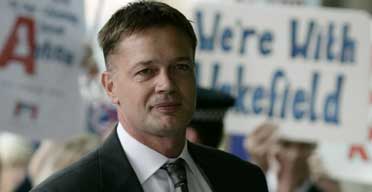
Dr Andrew Wakefield, the lead author of a controversial study that provoked a scare over the safety of the MMR vaccine, is a hugely divisive figure.
To his supporters he is a champion taking on a "Stalinist" medical establishment. To his critics he is a dangerous maverick whose claims have provoked unnecessary panic among millions of parents and risked outbreaks of three diseases that remain potential killers.
Wakefield, a surgeon who became a gut expert, first came to public attention in 1998 when he co-authored a study published in the Lancet medical journal. It suggested there was a possible link between rising rates of autism and a bowel disorder in children and the triple measles, mumps and rubella vaccine.
Speaking at a press conference at the launch of the paper, Wakefield said he believed the combination of the three vaccines might overload the body's immune system, leading children to develop the bowel disorder, Crohn's disease, linked to autism. He called for single vaccines to be provided for the three diseases because there were "sufficient anxieties" over the safety of the MMR jab - given to babies at 12-15 months.
His comments, and the subsequent media furore, led to a sharp drop in the number of children vaccinated against measles, mumps and rubella in 1989. Some parents went private to pay for single jabs for their children; others rejected the vaccination altogether.
Prior to Wakefield's warning, 91.5% of children in England had the MMR jab by the time they turned two. After the research came out, immunisation rates fell below 80%.
The take-up has increased, to 85% last year, but the World Health Organisation says 95% is necessary to ensure "herd immunity". So there are still not enough people vaccinated to ensure they neither get the illnesses nor pass them on to others. There were 971 cases of measles in England and Wales last year.
The drop in immunisation rates provoked the chief medical officer for England, Sir Liam Donaldson, the then health secretary, and Tony Blair, who was prime minister, to criticise Wakefield.
In 2001 he resigned from his £50,000-a-year NHS post at the Royal Free hospital, London, after 14 years in the job. This came a month after he was made a fellow of the Royal College of Pathologists in recognition of his research. A statement from the hospital said his research was "no longer in line with the department of medicine's research strategy and he left the university by mutual agreement".
In 2004 it emerged that Wakefield was being paid by lawyers acting for parents who thought their children might have been damaged by the vaccine. The editor of the Lancet, Richard Horton, said he would not have published the controversial report had he been aware of this "fatal conflict of interest".
Wakefield now lives in the US, where he is the executive director of research at Thoughtful House, a non-profit school and clinic in Austin, Texas, that treats children with autism from across the world. He has returned to the UK to defend himself against charges of serious professional misconduct at the General Medical Council (GMC). He begins giving his evidence today and is expected to be cross-examined over four or five days.
The GMC's fitness to practise hearing has heard allegations that Wakefield and the co-authors of the 1998 paper, professors John Walker-Smith and Simon Murch, acted unethically while carrying out their research. They are also accused of being dishonest and irresponsible in dealings with the Lancet. If the doctors are found guilty, they could be struck off the medical register and barred from practising medicine in the UK.
Ten of the authors of the Lancet paper spoke out against Wakefield by issuing a partial retraction of the study's findings. Prof Murch said "there is now unequivocal evidence that MMR is not a risk factor for autism". Several major studies in recent years have also concluded there is no link between MMR and autism in children and that the triple jab is not dangerous.
But Wakefield continues to raise concerns about the safety of the vaccine. In a recent interview with the Observer newspaper, he said: "I've done what I've done because my motivation is the suffering of children I've seen and the determination of devoted, articulate, rational parents to find out why part of them has been destroyed, why their child has been ruined.
"I can't tell you that we know that the MMR vaccine causes autism. But the Department of Health can tell you with 100% certainty that it doesn't, and they believe that, and that concerns me greatly."
His supporters have vowed to help clear his name and more than 7,000 signatures have been collected in an online petition.
The GMC inquiry is unlikely to resolve the rows about Wakefield's work. In a statement the regulatory body made clear its investigation would not assess the merits or safety of the MMR jab.

